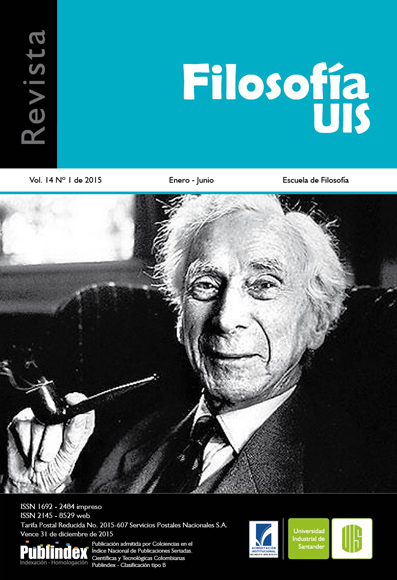Published 2015-06-05
Keywords
- moral,
- self-preservation,
- justice,
- state of nature attenuated,
- covenant
How to Cite
Copyright (c) 2015 Andrés Sandoval Sarrias

This work is licensed under a Creative Commons Attribution 4.0 International License.
Abstract
Interpretations of Hobbes's Moral may be divided into three interpretative readings: Egoistic Reading (ER), Naturalist Reading (NR), and Individualist or Voluntarist Reading (VR). In this paper, I will argue in favor of a fourth interpretation understood as an agreement (AR). I will argue that only this version satisfies Self Preservation Hobbes' principle and also brings an answer to the question: Who protects the initial covenant that gave rise to the State whether by this time there is not supreme power and it is in a state of nature when is not rational to comply with the covenants? I will support the idea of an operating moral in a state of nature attenuated that leads to the initial pact which founds the Civil State.
Downloads
References
- Gauthier, D. (1977). “The Social Contract as Ideology”. Philosophical Review. 88 (10). pp. 547-559.
- Gauthier, D. (1994). La moral por acuerdo. Barcelona: Gedisa.
- Hampton, J. (1986). Hobbes's and the Social Contract Tradition. Cambridge: Cambridge University Press.
- Harvey, M. (2009). “Hobbes's Voluntarist Theory of Morals”. Hobbes Studies. 22 (1). pp. 49-69.
- Hobbes T. (1994). El Leviatán. México D.F: Fondo de Cultura Económica.
- Kavka, G. (1986). Hobbesian Moral and Political Theory. New Jersey: Princeton University Press.
- Lloyd, S.A. (2009). Morality in the Philosophy of Thomas Hobbes. London: Cambridge University Press.
- Lloyd, S.A. (2010). “The Moral Philosophy of Thomas Hobbes: A Reply to Critics”. Hobbes Studies. 15 (2). pp. 180-187.
- Martínez, M. (2008). Hobbes y la moral egoísta en el estado de naturaleza. Revista Ideas y Valores. VI (136). pp. 5-26.
- Nagel. T. (2004). La Posibilidad del Altruismo. México: Fondo de cultura económica.
- Raphael, D.D. (1977). Hobbes Morals and Politics. London: British Library Cataloguing.
- Rosas, A. (2011). “La evolución de la moral contractual”. Revista Ideas y Valores. IX (147). pp. 209 – 222.
- Strauss, L. (2006). La filosofía política de Hobbes. Su fundamento y su génesis. Buenos Aires: Fondo de Cultura Económica.
- Taylor, A.E. (1938). “The Ethical Doctrine of Hobbes”. Philosophy. 13 (52). pp. 406-424.
- Warrender, H. (1957). The Political Philosophy of Thomas Hobbes: His Theory of Obligation. London: Oxford University Press.
- Watkins, L.W.N. (1972). Qué ha dicho verdaderamente Hobbes. Madrid: Doncel.
